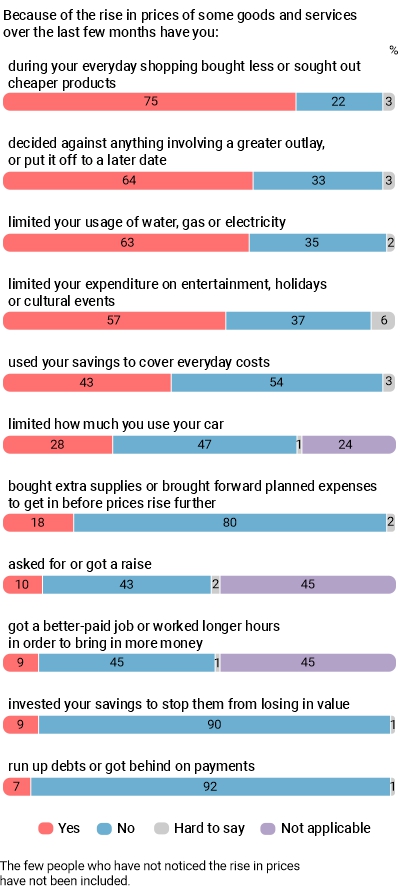38/2021
2021-12-01
Strategies in the Face of Inflation
Inflation in Poland is the highest it has been for 20 years. People have a variety of methods for coping with rising prices. A decided majority try to limit what they spend on their everyday shopping either by buying less or by seeking out cheaper products (75%). When faced with inflation many people put off major outlays or pull out of them altogether (64%), limit their usage of water, gas and electricity (63%) or their expenditure on entertainment, holidays and cultural events (57%). There are also people who do the exact opposite: concerned that prices will keep going up, they start stockpiling (18%).
Rising prices have a direct effect on the state of respondents’ finances. Because of inflation a large part of those surveyed have to use their savings to cover everyday costs (43%), while those without any more savings run up debts (7%). Those with more savings at their disposal look for ways of investing them so they do not decrease in value (9%).
Not a small percentage deal with the rise in the cost of fuel by using their cars less (28%). Inflation also affects the job market: people are more inclined to look for better-paid work or to work longer hours to bring in more money (10%) and, generally there is an expectation that wages should increase (9%).

|
More on this subject in the CBOS report.
This ‘Current Events and Problems’ survey (377) was conducted using a mixed-mode procedure on a representative sample of named adult residents of Poland, randomly selected from the National Identity Number (PESEL) register.
Respondents independently selected one of the following methods:
– Computer Assisted Personal Interview (CAPI);
– Computer Assisted Telephone Interview (CATI), respondents receiving researchers’ telephone numbers in an introductory letter from CBOS;
– Computer Assisted Web Interview (CAWI), where respondents filled in the online questionnaire independently, gaining access by means of a login and password provided in an introductory letter from CBOS.
– Computer Assisted Personal Interview (CAPI);
– Computer Assisted Telephone Interview (CATI), respondents receiving researchers’ telephone numbers in an introductory letter from CBOS;
– Computer Assisted Web Interview (CAWI), where respondents filled in the online questionnaire independently, gaining access by means of a login and password provided in an introductory letter from CBOS.
In all three cases the questionnaire had the same structure and comprised the same questions. The survey was carried out between 4 – 14 October 2021 inclusive on a sample of 1161 people (55.2% using the CAPI method, 28.9% CATI and 15.9% CAWI).
CBOS has been conducting statutory research using the above procedure since May 2020, stating in each case the percentage of personal, telephone and internet interviews.





